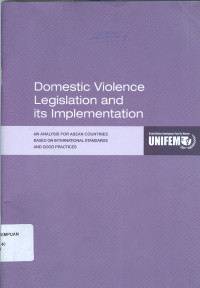
Text
Domestic violence legislation and its implementation : an analysis for ASEAN countries based on international standards and good practices
This research paper analyzes the laws of eight countries in Southeast Asia that address DV from the international human rights norms and standards and provides recommendations on how these laws should be improved. The issue of domestic violence has emerged as one of the primary public policy concerns in countries around the world. Countries in the ASEAN region have embarked on important initiatives in order to address the issue of domestic violence. It is in this context that sharing “good practices” and discussing comparative perspectives from initiatives around the world has provided recommendations and a template for developing common regional standards, reiterating that there is no impunity for violence. Violence Against Women, whether in the public sphere or the private space of domesticity, is a human rights violation. In its General Recommendation 19 the CEDAW Committee states, that the defi nition of discrimination against women includes gender–based violence, that is “violence that is disproportionately directed against a woman because she is a woman or that affects women disproportionately. It includes acts that infl ict physical, mental or sexual harm or suffering, threats of such acts, coercion and other deprivations of liberty. Gender-based violence may breach specifi c provisions of the Convention, regardless of whether those provisions expressly mention violence”. The United Nations and the ASEAN have issued their respective declarations on the elimination of violence against women. Eight of ten ASEAN countries have legislation on domestic violence. The phenomenon is however widespread in Asia as in other parts of the world. Legislation that lacks a comprehensive defi nition of domestic violence, laws that are gender-neutral, that do not clearly defi ne domestic violence as a human rights violation, that do not judiciously combine penal sanctions with provisions for reconciliation and that lack provisions for prevention and robust and accessible remedies, contribute to continued prevalence. Tardiness in legal implementation and a lack of accountability are the other major reasons for the pervasiveness of domestic violence. This is often grounded in gendered mindsets – for example, the idea that women need to be disciplined if they transgress traditional boundaries, or that domestic violence is a private family concern perpetrated by non state actors and is consequently beyond the purview of state responsibility. The inadequate recognition of domestic violence as a human rights violation has slowed down state action on de jure obligations under CEDAW and other international instruments. Ending violence against women is one of the thematic priorities of the UN Entity for Gender Equality and the Empowerment of Women (UN Women). UN Women builds on the support that the United Nations Development Fund for Women (UNIFEM), now part of UN Women, has been providing to state parties and civil society organizations in East and Southeast Asia to formulate and advocate for legislations on domestic violence. UN Women will also continue to support efforts to provide protection and remedies to the survivors and to strengthen governments’ cap but a robust framework to enhance the gender responsiveness of legislation and its implementation.
Second part of the publication highlights global good practices on the implementation of these laws with emphasis on the coordinated multi-stakeholder response system with a survivor at the centre, a system that is human rights based and gender sensitive.
Availability
| KP.IV.1-00009 | KP.IV.1 LAW D | My Library | Available |
Detail Information
- Series Title
-
-
- Call Number
-
KP.IV.1 DAR d
- Publisher
- Bangkok : United Nations Development Fund for Women (UNIFEM)., 2009
- Collation
-
xvi, 55 Hlm.; 30cm.
- Language
-
English
- ISBN/ISSN
-
-
- Classification
-
KP.IV.1.
- Content Type
-
-
- Media Type
-
-
- Carrier Type
-
-
- Edition
-
June 2009
- Subject(s)
- Specific Detail Info
-
-
- Statement of Responsibility
-
-
Other version/related
No other version available
File Attachment
Comments
You must be logged in to post a comment
 Computer Science, Information & General Works
Computer Science, Information & General Works  Philosophy & Psychology
Philosophy & Psychology  Religion
Religion  Social Sciences
Social Sciences  Language
Language  Pure Science
Pure Science  Applied Sciences
Applied Sciences  Art & Recreation
Art & Recreation  Literature
Literature  History & Geography
History & Geography